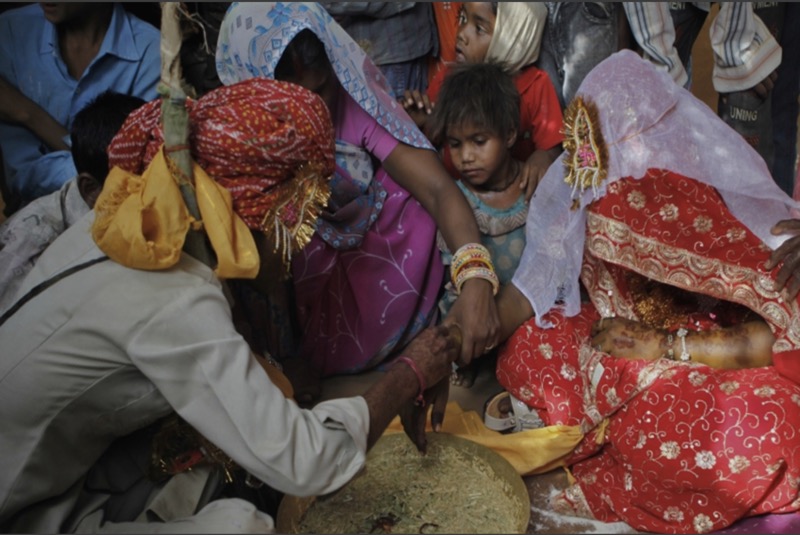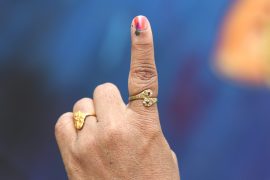Child marriages are illegal in India. The Prohibition on Child Marriage Act makes promoting or permitting child marriages an offence. Yet, child marriages are a regular occurrence in India. ‘India is home to the largest number of child brides in the world: 223 million child brides – a third of the global total,’ according to a UNICEF report. Though it is illegal for girls under 18 to marry in India, estimates suggest that at least 1.5 million girls under 18 get married in India each year.
Underage girls are often forced, groomed and persuaded into marriage – even if they have not attained the physical and emotional maturity required to understand the implications of marriage. Girls who get married at a young age, more often than not, end up in domestic servitude. They are subjected to domestic violence and sexual abuse, and denied education or meaningful work. Child marriages perpetuate the cycle of poverty and gender inequality.
But why do people get away with child marriages even when it is illegal? In rural India, particularly, the problem of child marriage persists. Though there has been a decrease in the number of child marriages in India, unfortunately, it has been normalised and is accepted as a social norm.
Under Section 5, clause iii, of the Hindu Marriage Act, 1955, marriage with a minor – a girl under 18 and a boy under 21–is voidable at the option of the minor. The Prohibition Of Child Marriage Act (PCMA) mentions the Hindu Marriage Act in Section 20, amending the punishment for child marriages under Hindu law. But it does not mention any other personal law.
Section 13 of the Hindu Marriage Act, 1955 states that every child marriage, whether solemnised before or after the commencement of the Act, shall be voidable at the option of the contracting party who was a child at the time of marriage, provided a petition for annulling the child marriage was filed in the concerned district court.
The provision also restricts that such a petition should be filed before the child completes two years of attaining majority. This means a man could file such a petition before he completes 23 years of age, whereas a woman should file the petition before she completes 20 years.
Given the socio-economic circumstances in India, most girls do not have a say in their marriages. Parents try to marry their under age children due to poverty. A post-COVID study conducted by UNICEF concluded that economic hardship “prompt many poor parents to consider getting their underage daughters married to men who do not demand dowry.”
Many parents “seem to be caught in a dilemma between adhering to the socio-legal justifications against child marriage and common fears of their adolescent girls falling prey to trafficking, runaway child marriages, abuse and ‘tarnishing family honour’ on account of late marriage.”
Furthermore, given abject poverty, lack of access to resources (particularly courts and other local authorities) and social stigma in approaching courts, how would the law work in their favour?
The problem of marrying underage women is particularly problematic among Muslim women, for whom, in many cases, the personal laws override the PCM Act. According to Muslim personal law, The general essentials for marriage under Islam are as follows:-
(i) Every Mohammedan of sound mind who has attained puberty can marry. Where there is no proof or evidence of puberty, the age of puberty is fifteen years.
(ii) A minor and insane (lunatic) who have not attained puberty can be validly contracted in marriage by their respective guardians.
(iii) The consent of the party is a must. The marriage of a Mahomedan, who is of sound mind and has attained puberty, is void if there is no consent.
The age of puberty is 15 years for both boys and girls. The problem here is that many children are married off at a young age because personal laws validate it and because the Prohibition on Child Marriage Act does not explicitly state if it would override personal laws.
Several High Courts have interpreted this provision in different ways. Consequently, we have conflicting judgements. While some courts ruled that PCM would prevail over child marriage, others stated that personal laws would override PCM. A case in point is the Karnataka High Court’s judgement in Seema Begaum D/O Khasimsab vs State Of Karnataka, delivered on 26 February 2013, where the court held that PCM would override personal laws.
There has been a contradiction in the Gujarat High Court, too. In a 2014 order, the Gujarat High Court recognised Muslim personal law and said: “According to the Personal Law of Muslims, the girl no sooner she attains the puberty or completes the 15 years, whichever is earlier, is competent to get married without the consent of her parents.” However, in 2015, it ruled that the 2006 law was a “special act” and would override the provisions of Muslim personal law, Hindu Marriage Act or any personal law.
In 2018, the Punjab and Haryana High Court ruled the opposite, saying Muslim personal law would not override the 2006 Act. It ruled that puberty and majority in Muslim law are the same and that “a boy or girl who attained puberty is at liberty to marry anyone he or she likes, and the guardian has no right to interfere”.
Such contradictory judgements by the Courts are often based on facts and circumstances of the case. In some instances, the minor willingly consents to the marriage. Therefore, if the court goes by the PCM act to declare the marriage as void ab initio, the minor would have to be under the guardianship of the parents.
Given the social stigma associated with ‘love marriages,’ it is unlikely that a girl’s safety and security can be guaranteed. Therefore, in some circumstances, courts find loopholes in the PCM and take the cover of personal laws to ensure that the aggrieved party can have a safe life however they want.
If India makes a hard and fast law that declares all child marriages under personal law as null and void, it will test the validity of the union of several couples who have married before attaining the legal age. But the question remains: given the evils of child marriage, can India have a uniform law for prohibiting child marriage that would prevail over all personal laws? Or, would it leave such matters to the learned court to decide upon each case?
-30-
Copyright©Madras Courier, All Rights Reserved. You may share using our article tools. Please don't cut articles from madrascourier.com and redistribute by email, post to the web, mobile phone or social media.Please send in your feed back and comments to [email protected]











